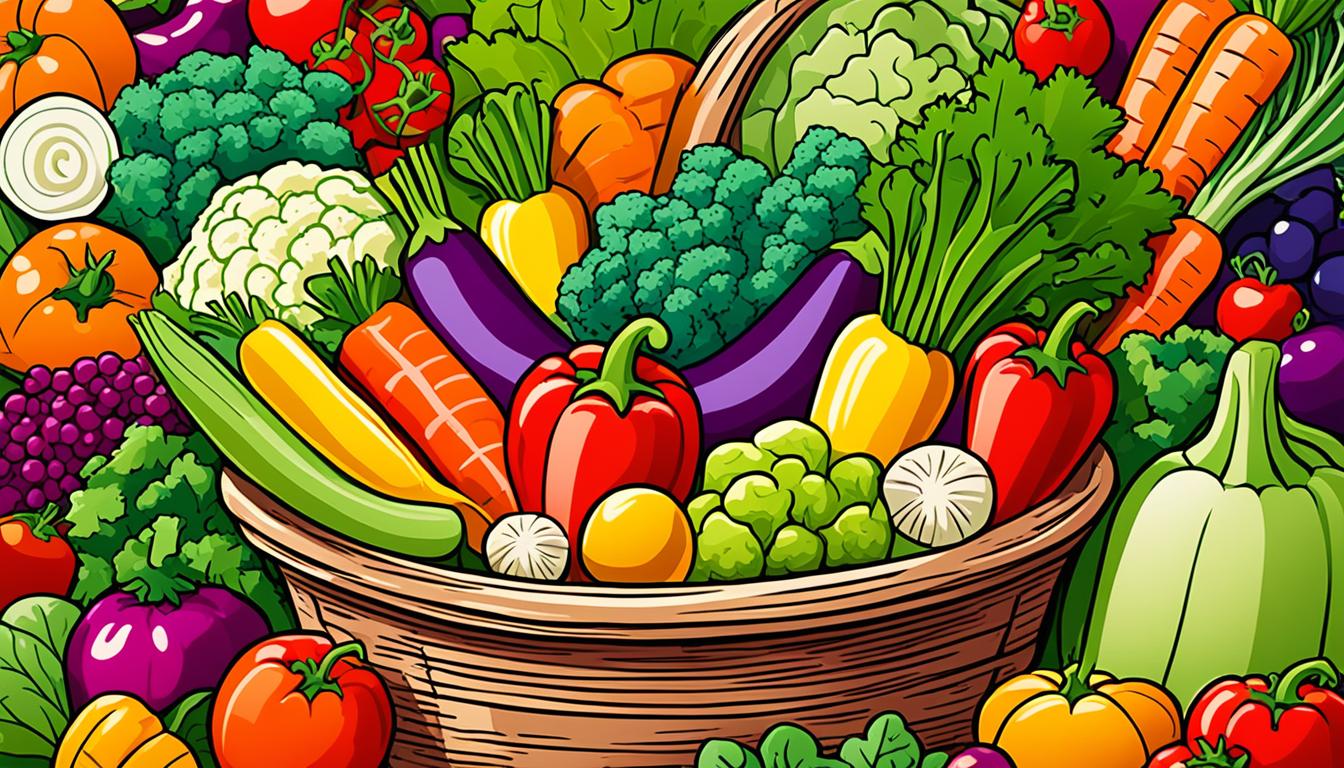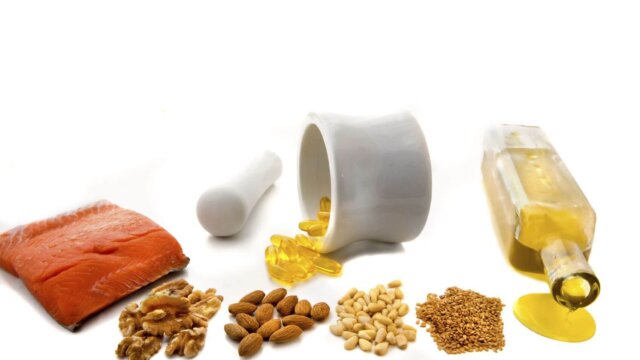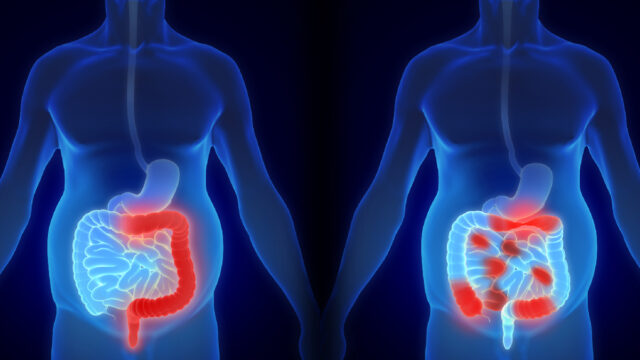FTC disclaimer: This post may contains affiliate links and we will be compensated if you click on a link and make a purchase.
Did you know that 15% of people in Western countries have a sensitive gut? This condition is called irritable bowel syndrome (IBS). The good news is you can help your digestive health by eating certain vegetables. Adding a variety of veggies to your meals is great for you. Veggies like mushrooms, baby spinach, bean sprouts, lettuce, and peas do wonders for your gut.
These vegetables work well for your gut because they are full of fiber, water, or polyphenols. A strong gut means more energy, better tissue growth, and repair. The little world of microbes in your gut can lessen inflammation. They also help keep your blood’s sugar and fat in check. Some research shows certain veggies are better for your gut’s friendly bacteria.
Key Takeaways
- Certain vegetables like mushrooms, baby spinach, and cucumbers are particularly beneficial for gut health
- Fiber-rich vegetables and those containing polyphenols can support a healthy gut microbiome
- A diverse gut microbiome plays a key role in overall health, including energy levels, tissue growth, and inflammation control
- Optimal colon function requires a daily intake of at least 25 grams of fiber
- 70% of immune cells reside in the cells lining the colon
Importance of Gut Health
Digestive issues like gas, constipation, and diarrhea hit many. About 15 percent of people in Western places battle a tough type of gut problem – irritable bowel syndrome, or IBS. A well-balanced gut – with lots of different tiny organisms – is key for good health.
It helps the body digest food, guards the immune system, and even influences our moods. Keeping your gut’s little world happy is crucial for staying well all over.
Role in Digestion
Keeping the colon healthy needs at least 25 grams of fiber every day. Leafy greens like spinach and kale are great. They have the right sugars to nourish the good bacteria in your gut. For folks with IBS or a sensitive stomach, lean proteins are a better choice.
This helps keep the colon calm by avoiding foods that might set it off. Be careful with high-fat treats, though. Foods like red meat can grow bad bacteria in the colon, which is linked to heart problems.
Impact on Overall Well-being
Your gut’s tiny community does a lot for your health and mood, 70% of your immune cells live there. A happy gut equals a happy you. It keeps your digestion, immune system, and even your feelings in good shape, which helps you feel well all over.
Fiber-Rich Veggies for Digestive Support
Whole grains, leafy greens, and lean proteins are super for your tummy. They offer plenty of fiber and healthy fats. This helps the cells in your colon stay strong and work well.
Greens are also full of fiber and vitamins. They have a sugar that’s great for growing good gut bacteria. If you have tummy troubles, stick to proteins that are not high in fat.
Soluble vs. Insoluble Fiber
The experts say you should eat about 14 grams of fiber for each 1,000 calories. Guys 19-50 need 38 grams each day, but gals in the same group can have 25 grams. But, most people in the U.S. eat only about 15 grams, which is not enough.
Promoting Regular Bowel Movements
Fiber, both types, is good for the good bacteria in your gut and helps your stomach work well.
Vegetables that are rich in fiber, like pears and avocados, can help you go regularly. Pears, for example, have 5.5 grams of fiber in a medium pear. Avocados have 10 grams of fiber in a cup. As for oats, they give you 16.5 grams of fiber in a cup. Apples carry 4.4 grams in a medium one. Lentils, beans, and popcorn are also great sources of fiber.
Young women need 25 grams of fiber daily, and men need 38. Older women should have 21 grams, while older men need 30 grams.
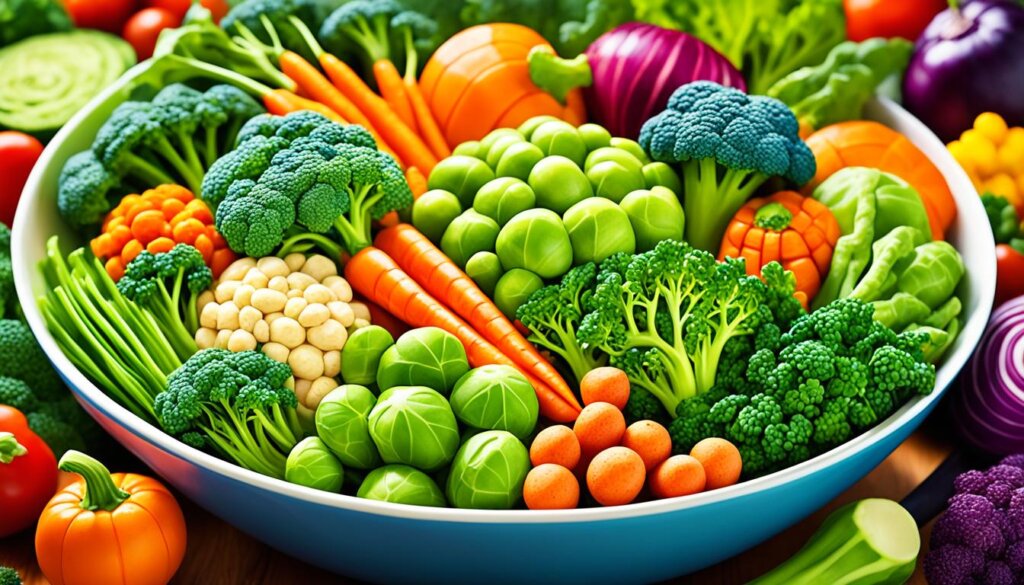
Prebiotic-Rich Greens
A new study from Graz University of Technology has good news. Eating more fruits and veggies may boost the mix of gut bacteria. This is great for our health.
The research also found a link between more fruits and veggies in babyhood and a stronger immune system. It suggests that fresh is best for our gut health. Plus, how we store and prepare our food matters too. Between the ages of 1 and 3, trying many different kinds of these foods is important. This helps build a healthy mix of gut bugs. Both types of fiber, soluble and insoluble, are good for our gut bugs and our gut itself.
Nourishing Gut Bacteria
Mushrooms are full of special compounds. These work like food for our gut bugs.
Cucumbers are great too. They have lots of plant compounds. These include polyphenols. Polyphenols can help grow the good bacteria in our guts.
Baby spinach is a powerhouse. It has vitamins A, C, and K, plus minerals iron and calcium, and polyphenols.
Watercress has special polyphenols called flavonoids. These are good news for our gut health.
Promoting Gut Microbiome Diversity
Eating lots of different prebiotic-rich veggies is key. Veggies like leeks, bean sprouts, lettuce, and green peas help. They can make your gut team with good bacteria.
Zucchini and cauliflower also do a great job. They have fibers that these good bacteria love.
Adding these veggie superstars to your meals helps your overall health. They can boost your digestion and immunity too.
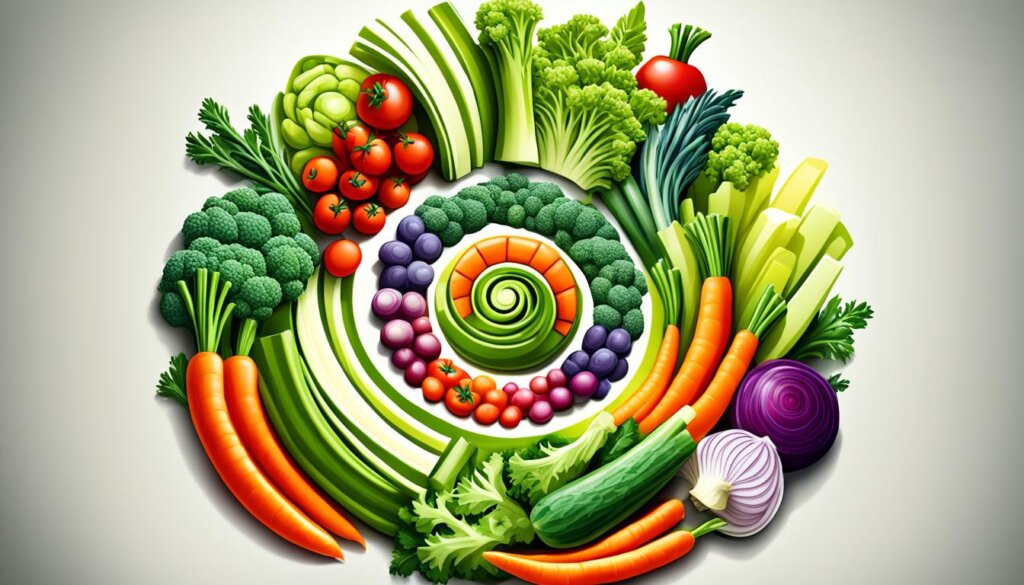
Easy-to-Digest Vegetables
If gas and bloating bother you, cut down on fructose, or fruit sugar. Fruits like apples, pears, and mango are full of fructose. But, berries and citrus fruits have less fructose. This means oranges, grapefruits, and bananas are better for you. Bananas are great since they’re low in fructose, have a lot of fiber, and boost good gut bacteria. Avocados are low in fructose too and offer lots of fiber and nutrients.
Low-FODMAP Options
Some vegetables are friendly to your stomach because they’re low in FODMAPs. These are substances that can cause tummy troubles for some. Good choices include mushrooms, cucumbers, baby spinach, and watercress. Eating these veggies helps keep bloating and gas away.
Preventing Bloating and Gas
Choosing easy-to-digest, low-fiber food is another way to avoid bloating and gas. Dishes like applesauce, bananas, and chicken are usually fine for most people. White bread and rice are good picks too. Yummy as they are, not everyone can handle kimchi or yogurt easily.
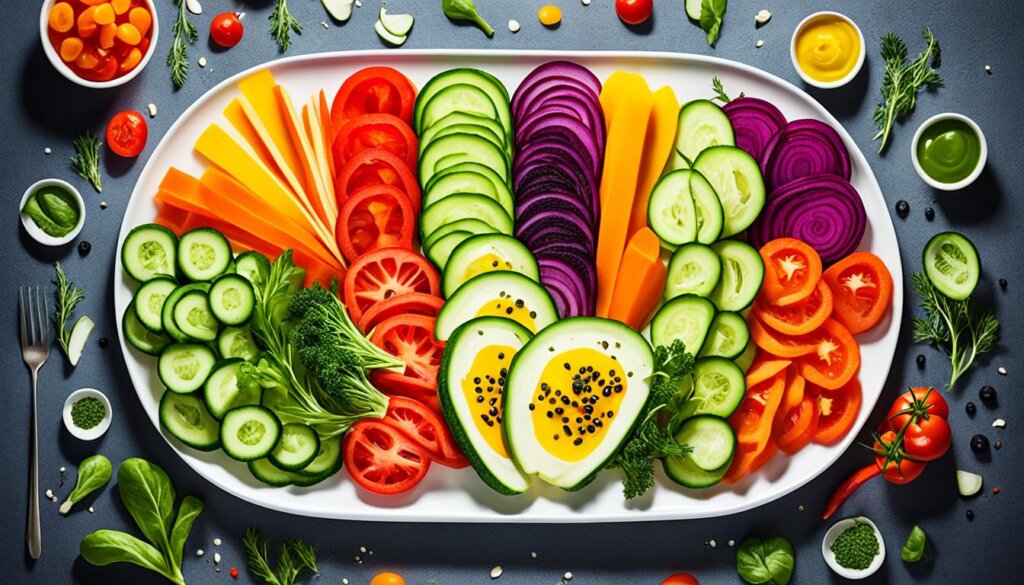
Best Vegetables for Digestion
Maintaining a healthy gut is key to our health. Certain veggies help our digestion a lot. Veggies like mushrooms, cucumbers, and baby spinach are great for our gut. They have compounds that boost good bacteria and make digestion better.
Mushrooms
Mushrooms are full of prebiotics. Prebiotics help good bacteria in our gut thrive.
Cucumbers
Cucumbers have plant compounds that feed gut bacteria. They also have polyphenols that aid in growing good bacteria. Plus, their high water content keeps our digestive system on track.
Baby Spinach
Baby spinach is loaded with vitamins and minerals. It has vitamins A, C, K, and minerals like iron and calcium. Not to mention, it’s full of polyphenols that help our gut.
Watercress
Watercress has flavonoids that are great for our gut. This peppery green is also a source of vitamins and minerals. Adding it to your meals is a smart choice for your health.
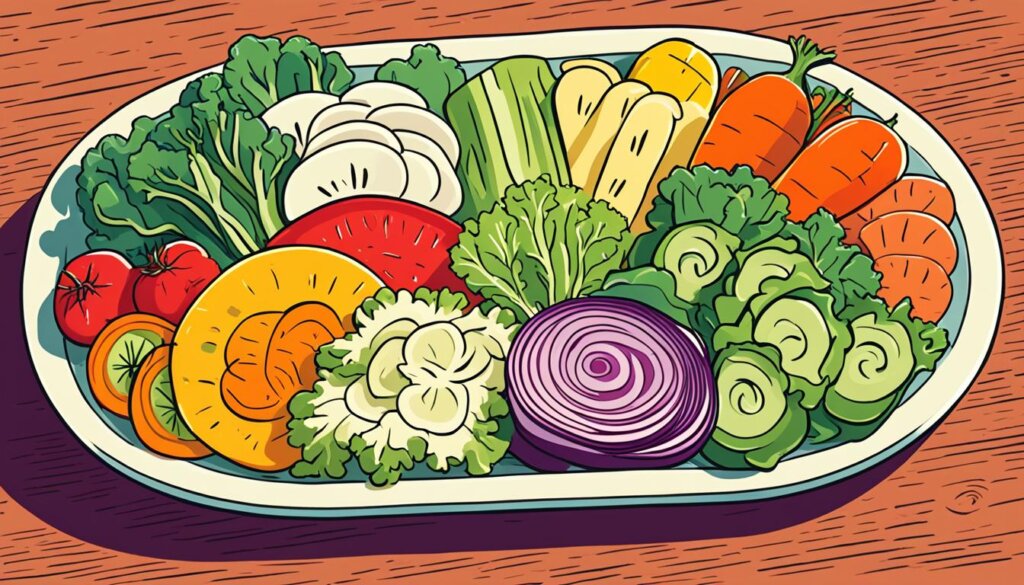
Anti-Inflammatory Vegetables
Anti-inflammatory vegetables are key for a healthy gut. They cut down on gut swelling and help the gut barrier work well. This is vital for how our digestion and immune system operate.
Reducing Gut Inflammation
Cucumbers have plant parts that stop swelling and fight off harmful gut bugs. Leafy greens, like spinach or kale, are packed with fiber. They also have great nutrients such as folate, vitamin C, K, and A. Studies find that leafy greens have a sugar that boosts good gut bugs. Eating many different fiber-rich veggies helps make your gut healthier, which lowers swelling.
Supporting Gut Barrier Function
A strong, diverse gut ecosystem helps fight swelling and keeps the gut barrier in check. This barrier is the body’s gatekeeper. It lets good stuff in and keeps bad stuff out. By eating a range of anti-inflammatory veggies, you support a diverse gut. This, in turn, helps the gut barrier work better. It boosts your overall digestion and immune system.
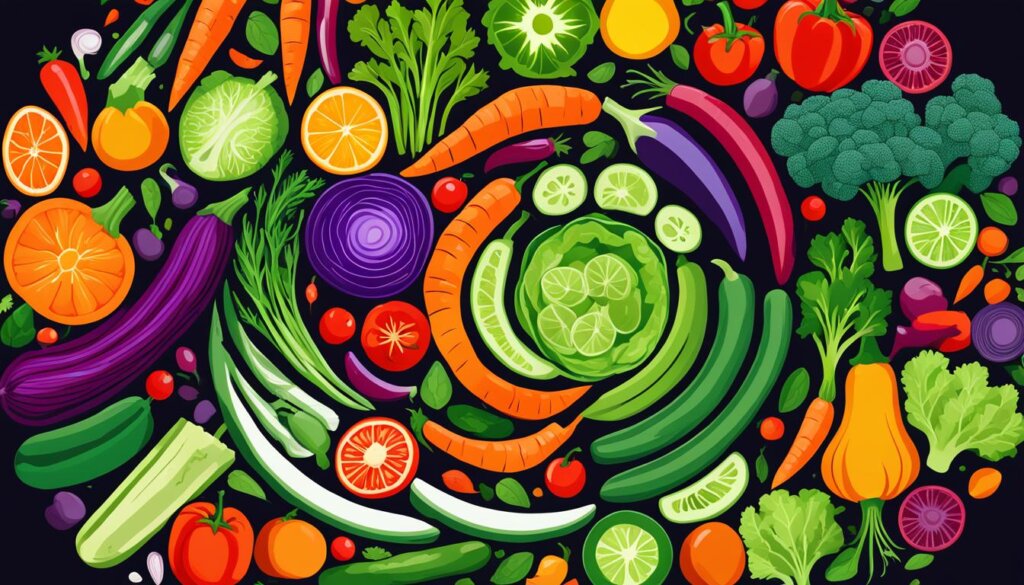
Nutrient-Dense Produce
Leafy greens, like spinach or kale, are full of fiber. They also have important nutrients. These include folate, vitamin C, K, and A. Mushrooms are great for your gut. They have compounds that work as prebiotics. Watercress is easy to add to meals. It spices up soups, sandwiches, and doesn’t need prep. Plus, It shines in pestos and dips. Watercress has many polyphenols, like flavonoids. These act as antioxidants. Spinach, kale, and watercress are loaded with good stuff. They have vitamins, minerals, and antioxidants. These help keep your gut healthy.
Vitamins and Minerals for Gut Health
Half a cup of raw, chopped broccoli gives 43% of your daily vitamin C. Kale is rich in vitamin K. It offers about 440% of what you need in a half cup. A red bell pepper has 169% of the RDI for vitamin C. Asparagus is brimming with folate. Just a half cup of it cooked has 134 micrograms. Cauliflower is a vitamin C powerhouse. It gives you nearly 100% of your daily need in a cup. These veggies are jam-packed with vitamins and minerals. They’re great for your gut.
Antioxidant Properties
A cup of cooked green beans has 4 grams of fiber. Beets can help with health problems like high blood pressure and insulin issues. They’re full of antioxidants. Nitrate in beetroot juice might make you better at sports. Studies show it can help with performance. Spinach, kale, and watercress are full of antioxidants. They can lower inflammation. This is good for your gut health.
Fermentable Carbohydrates
Whole grains like oats, quinoa, and bulgur are rich in fiber. They also give us omega-3 fatty acids. When fiber is chewed up by gut bacteria, it gives off short-chain fatty acids. These help our colon’s cell lining work well. That’s where most of our immune cells are. Leafy greens, such as spinach or kale, are great for fiber. They’re packed with goodies like folate and vitamins C, K, and A. Studies found that leafy greens have a kind of sugar that supports good gut bacteria. Soluble and insoluble fiber helps our gut stay healthy by giving it food.
Promoting Beneficial Gut Bacteria
FODMAPs are special kinds of carbs that can upset our stomach. They have names like fructans and lactose. Avoiding foods high in FODMAPs can really help people with irritable bowel syndrome (IBS). FODMAPs in the gut can make more water, gas, and short-chain fatty acids. This can lead to stomach problems.
Short-Chain Fatty Acid Production
The National Center for Complementary and Integrative Health says probiotics might help with various conditions. These include diarrhea, IBS, hay fever, and more. In 2018, a Foods study discovered that sauerkraut keeps its healthy bacteria even when packaged. Both soluble and insoluble fiber are key. They help our gut by feeding the good bacteria and keeping us healthy.
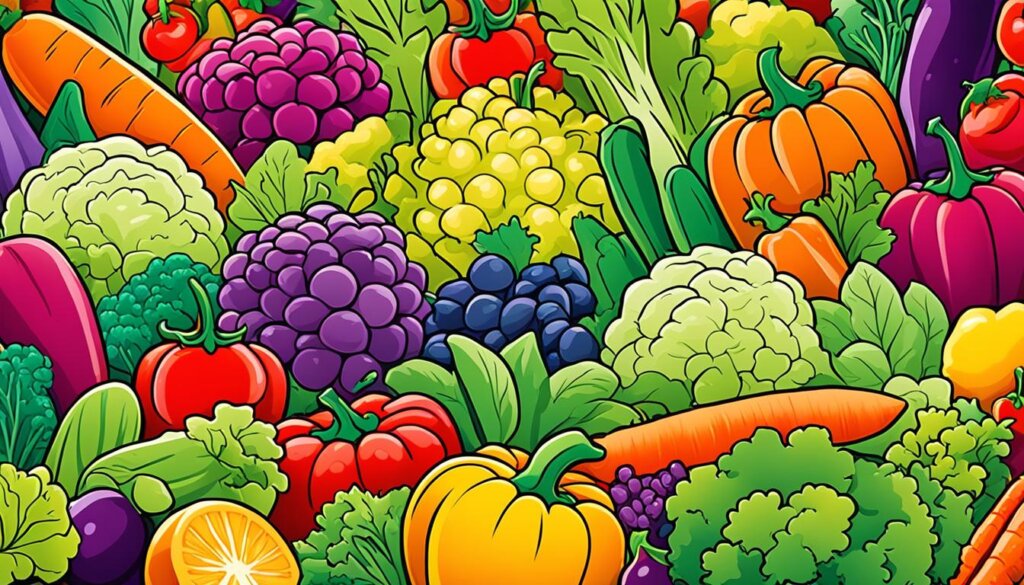
Gut-Friendly Food Preparation Tips
How you prepare vegetables matters for your gut health. Buy frozen spinach for a good deal. Frozen veggies keep lots of nutrients. They’re frozen right after picking. Adding bean sprouts to a stir fry or curry is a smart move. They add crunch and are good for your gut.
Raw vs. Cooked Veggies
Lettuce is great in soups and burritos. Also, it can swap bread in wraps or burgers. Turn Zucchini into noodles for a pasta that’s low-carb and full of fiber. Make a low-carb pizza crust from cauliflower too.
Incorporating Veggies into Meals
Adding more veggies is an easy way to better your digestive health. You can choose raw or cooked veggies. There are many fun ways to include them in your dishes. Try lettuce wraps or zucchini noodles. Enjoying these foods is a great step for gut-friendly food preparation.
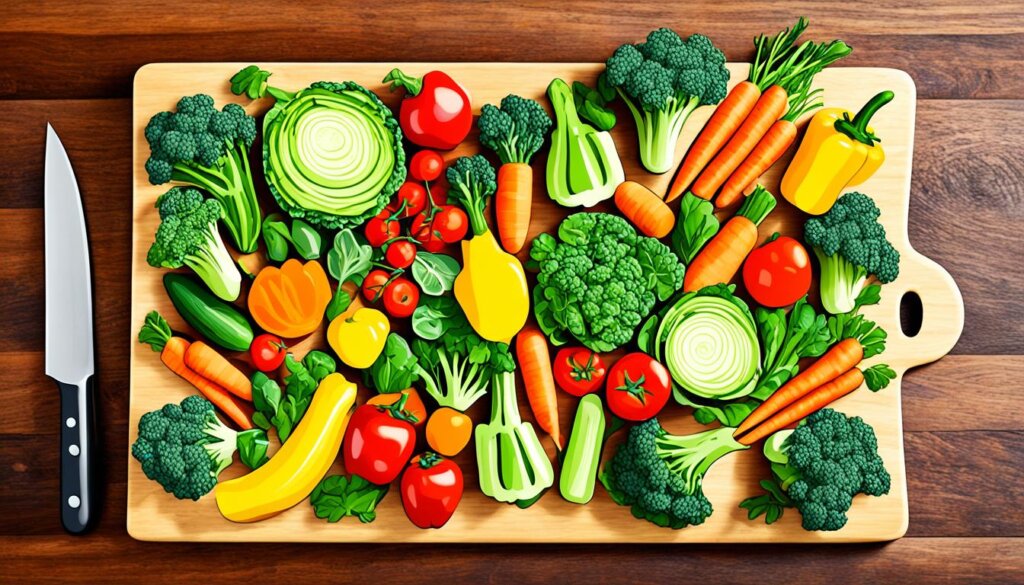
Digestive Aids
Cucumbers offer a lot for the good bacteria in your stomach. They have polyphenols, which help the good bacteria grow. Over 96% of a cucumber is water, making it great for staying hydrated. This water keeps your bowel movements smooth to avoid constipation.
Hydration
Hydration is key for a healthy digestive system. Drinking water keeps your body working well. It helps your stool stay soft and aids in avoiding constipation.
Probiotics and Prebiotics
Probiotics are live bacteria that are good for your body. They are best known for supporting your digestive health. On the other hand, Prebiotics are a type of fiber. They help the good bacteria in your gut to grow. Including foods rich in both can help keep your gut healthy and diverse.
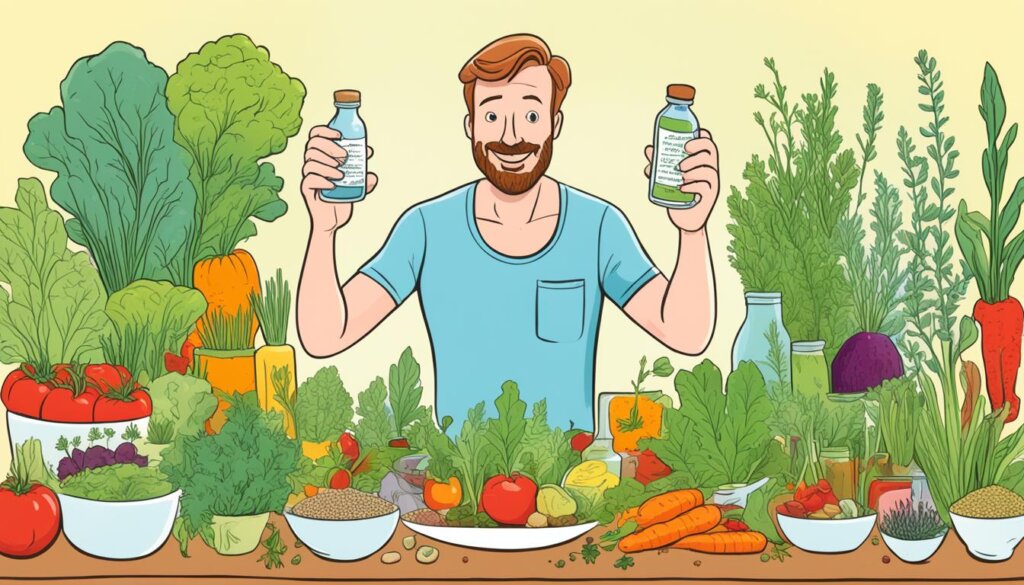
Gut Health Boosters
Looking to boost your gut health? Here are some tips beyond just eating veggies. Try whole grains like oats, quinoa, and bulgur. Also, load up on fruits, legumes, seeds, and nuts. For good bacteria, eat fermented foods like natural yogurt, kefir, kimchi, and miso. A little coffee is okay. But, cut back on ultra-processed stuff full of additives and unhealthy fats.
Exercise and Stress Management
Working out can be good for your gut by making the good bacteria more varied and healthy. It also lowers stress, which keeps your gut happy. Don’t forget, doing things like meditation or yoga can help, too.
Adequate Sleep
Sleeping well is key to a healthy gut. Aim to get 7-9 hours every night. This helps keep your whole body, including your gut, in top shape.
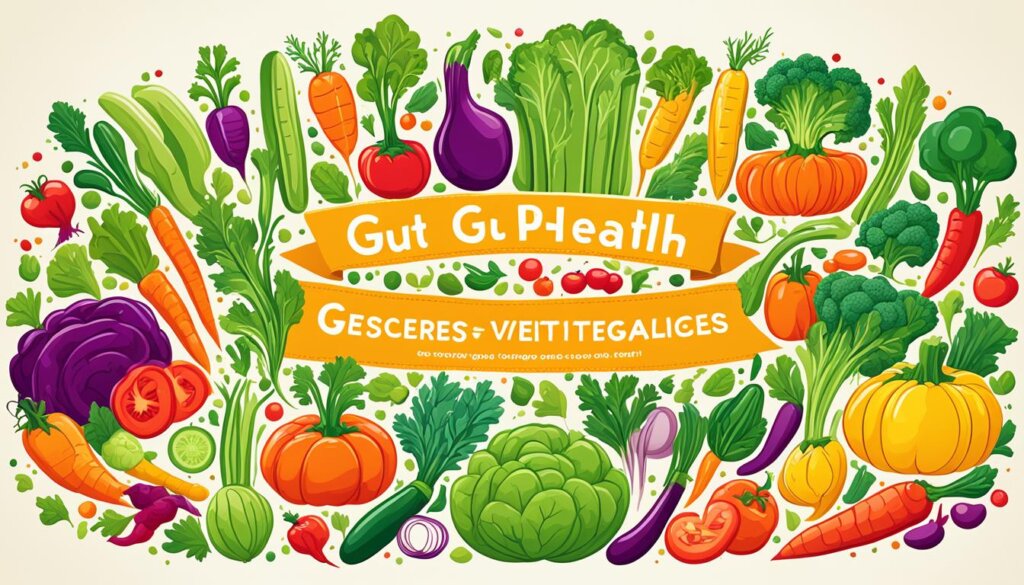
Personalized Approach
Does bloating or IBS make it hard for you to eat lots of fruits and veggies? Then, talking to a registered dietitian nutritionist could help. They can get your gut ready to enjoy many types of fruits and vegetables.
Considering Individual Needs
Did you know our gut microbiomes are mostly unique to us? Yes, studies show that around 80–90% of our gut bugs differ from someone else’s. So, to keep our gut healthy, we need a plan that’s just for us.
Working with a Healthcare Professional
A healthcare pro, like a registered dietitian nutritionist, can make a special gut health plan for you. This plan will make it easy to add many good-for-your-gut vegetables to your meals. Their help is key to feeling great all around.
Conclusion
The best vegetables for your gut health are those with lots of fiber or water. Some have special plant compounds that help too, like polyphenols. Fiber keeps your bowels working well and helps with constipation and diarrhea. It also makes your gut stronger, lowering the risk of problems like hemorrhoids. Adding mushrooms, cucumbers, baby spinach, and watercress to your meals can really boost your gut health.
Eating many different veggies and plants helps your gut stay filled with good bacteria. This is great for your overall health and how you feel. To keep your gut happy, aim for at least 24 grams of fiber daily if you’re a woman, or 38 grams if you’re a man. Good gut bacteria love fiber because they turn it into important stuff for your gut.
It’s vital to mix up the fruits and veggies you eat. How you cook them and how often you eat them matters too for a healthy gut. Try to eat smaller meals throughout the day instead of big meals at a few times. And, avoid eating late at night to give your gut a break. After eating, a bit of rest is good. Avoid doing too much right away so your body can digest well.
FAQ
What are the best vegetables for digestive health?
Vegetables like mushrooms, baby spinach, and peas are great for your gut. They are high in fiber and water. Plus, they have plant compounds that are good for you like polyphenols.
How do vegetables support a healthy gut microbiome?
Vegetables are great for your gut because they are full of fiber and nutrients. They help nourish the microbes in your gut. This keeps your digestion and immune system healthy.
What types of vegetables are best for preventing digestive issues?
Whole grains and leafy greens are top choices for your stomach. They are full of fiber, which is great for the gut microbiome. Also, lean proteins are easy on digestion.
How do fruits and vegetables influence the gut microbiome?
Studies show that eating lots of fruits and veggies makes your gut healthier. This is especially important for your immune system when you are young.
Which vegetables are low in fructose and easier to digest?
If you get bloated easily, try eating fruits low in fructose. Berries, citrus, and bananas are good choices. Avocado is also low in fructose and nice for your gut.
What are some vegetables that act as prebiotics for gut health?
Mushrooms and leafy greens like spinach help the “good” bacteria in your gut. They are full of prebiotic compounds that are good for the gut microbiome.
How can vegetables help reduce gut inflammation?
Leafy greens and mushrooms are great for calming gut inflammation. They are rich in fiber, vitamins, and minerals. This helps support your gut barrier.
What are some tips for incorporating more gut-friendly vegetables into my diet?
Use frozen spinach or add bean sprouts to dishes. You can also try using lettuce for wraps. Transform zucchini and cauliflower into low-carb options. Mixing up your veggies is important for a healthy gut.
Should I work with a healthcare professional to improve my gut health?
If you have ongoing stomach problems, a dietitian can help. They will make a plan just for you. This plan will include the best gut-friendly fruits and vegetables for you.
